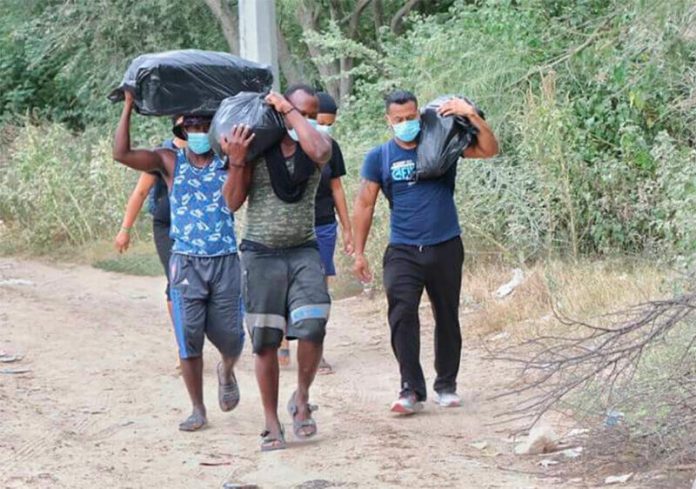Thousands of Haitian migrants have endured hellish journeys from South America to reach Mexico and the U.S., only to face possible deportation, lack of access to visas and an uncertain future.
More than 14,000 migrants, many from Haiti, ended up the camp at Del Rio, Texas, regularly crossing back into Mexico to buy food. Pictures of U.S. border patrol agents on horseback confronting migrants prompted outrage, including U.S. President Joe Biden, who called them “horrible” and “beyond embarrassing.”
The sudden focus on a long-simmering crisis has turned into a political crisis for the Biden administration, which has come under fire both from Democrats, who have denounced harsh treatment of the migrants, and Republicans who say White House policies have encouraged people to make the difficult journey.
A debate within the administration over how to address the crisis spilled out into the open last week, as Daniel Foote, the U.S. special envoy to Haiti, resigned over what he described as “inhumane” treatment of Haitians. That drew a public rebuke from the state department, which said Foote had mischaracterized the circumstances of his resignation.
As more migrants turn up at the southern U.S. border, activists say it has become harder to claim asylum. Rules introduced during the pandemic allow agents to immediately return those who cross the border. The U.S. government said on Friday that all the migrants had been cleared from the camp, with 2,000 deported to Haiti.
Dana Graber Ladek, head of the UN’s International Organization for Migration mission in Mexico, said the expulsion of Haitians was particularly concerning, since many had left their home country years ago. They may have no family ties left and face political instability, insecurity and a lack of opportunity, she said.
“We need to understand the nature of this migration,” she told the Financial Times. “These are individuals who are simply seeking a better life for themselves and for their children.”
In the years after a devastating 2010 earthquake in Haiti that killed more than 200,000 people, tens of thousands of people left the country and scattered across South America, often in Chile and Brazil.
After work opportunities dried up, many headed for Mexico in recent months, making a perilous trip across borders. The migrants travel first up to northern Colombia, where there are some 19,000 Haitians awaiting a boat crossing that would leave them close to Panama.
The presidents of Costa Rica, Panama and Dominican Republic expressed deep concern over the crisis in Haiti and its impact on the region in a letter on Wednesday, asking the U.S., UN and EU for help finding structural solutions.
As more migrants began arriving in August, the Colombian and Panamanian foreign ministries agreed that just 500 migrants would be allowed to cross each day, using two local boat services. The beach at Necoclí, Colombia, which has become a bottleneck for the migrants, is packed with tents.
![]()
“We’re worried that we’re going to have a health crisis on our hands, and we won’t have the capacity to respond,” said Necoclí Mayor Jorge Tobón.
From there, migrants take on the most perilous part of the trip: a multi-day trek across Panama’s Darién Gap, a jungle that is home to gangs, treacherous rivers and poisonous snakes and without roads or mobile phone reception.
“It was tragic,” said Joseph, who left Haiti in 2015 and recently traveled north from Chile, of the Darién. “There are things that one doesn’t want to see twice … seeing dead people, sleeping in unsafe places.”
Even if migrants cross Central America, they face immigration crackdowns in Mexico, which has stepped up deportations and deployed the National Guard to try to contain migrants.
Three times more Haitians have requested refugee status in Mexico this year than in 2019 or 2020. Fewer than one-third of those whose cases have been resolved this year obtained refugee status, according to Comar, the Mexican state agency for helping refugees.
One Haitian migrant, Jean-Louis, tried to get a residency permit through Comar when he reached Tapachula, Chiapas, after a journey that took him across nine countries, where he saw fellow migrants drown and was robbed by gangs. It was denied, and he said he was appealing.
Despite that, he has no intention of returning to Haiti, having left in 2017. “The country is in a very complicated state, like Afghanistan,” the 42-year-old said of his home country. “I want to stay in Mexico … I don’t have any family in Haiti,” he said from Tapachula.
Yuriria Salvador, structural change co-ordinator at the Fray Matías de Córdova Human Rights Center in the same city, said the organization had seen a big increase in the number of Haitians seeking help. In Mexico, they experienced racism and lived in cramped housing with limited access to water, she said.
Despite expectations of a softer approach to migration, both the Mexican government of President López Obrador and Biden’s administration have maintained many of the same practices of their predecessors.
“There were a lot of expectations that there might be a much more humanistic vision,” Salvador said of Mexico’s government. “There wasn’t a change in policies either here or in the U.S.”
In his morning news conference Friday, López Obrador said he did not want Mexico to become a migrant camp. He said the U.S. should support development in Latin America and that the UN should intervene to help Haiti.
Joseph has been waiting six weeks for his interview in Tapachula for a residency permit from Comar. When he gets it, he doesn’t mind where he lives in Mexico, but he wishes it would go faster.
“The money we had to be able to eat is running out,” he said.
© 2021 The Financial Times Ltd. All rights reserved. Please do not copy and paste FT articles and redistribute by email or post to the web.
